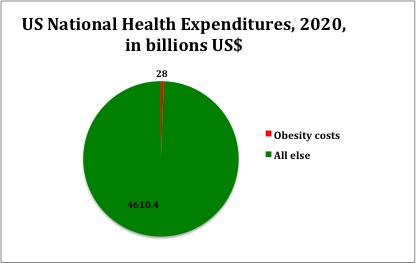Research says: Obesity is a problem, but solving it doesn’t fix our health care spending problem, just a very small step in the right direction.
After Aaron’s fat-laden post on the “food” at the Indiana State Fair, The Lancet released a thoughtful issue on obesity, including estimates that obesity-related health costs in the US will reach $28 billion in 2020. Wang YC, McPherson K, Marsh T, Gortmaker SL, Brown M. Health and economic burden of the projected obesity trends in the USA and the UK. The Lancet 2011;378:815-25 (gated). This sounds like a lot until you compare it to US NHE in 2020:
Sources: Wang YC, et al. Lancet 2011;378:815-25 ($28 billion); US NHE, 2020, table 1.
More obesity news from The Lancet: experts have underestimated how significant calorie reductions need to be in order to lose sustained weight. The new models call for daily caloric reductions in range of 30 – 40% for very significant weight loss (ie, a 220 pound sedentary man reducing his 3000 calorie/day diet down to 1800 per day, in order to lose 44 pounds in 6 months). Hall KD, Sachs G, Chandramohan D, Chow CC, Wang YC, Gortmaker SL, Swinburn BA. Quantification of the effect of energy imbalance on bodyweight. The Lancet 2011;378:826-837 (gated).
Bottom line: very significant reductions in US caloric intake will save 0.6% of health care costs by 2020.
Aaron’s 2010 posts (the blame du jour) and (I’m not saying obesity isn’t a problem) reached similar conclusions.
UPDATE: Sarah Kliff, writing over at Ezra’s place, covered the same studies. Everything she writes correctly reflects the articles. And yet, our posts are very different.


